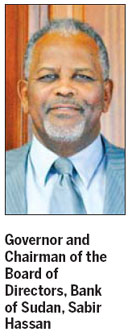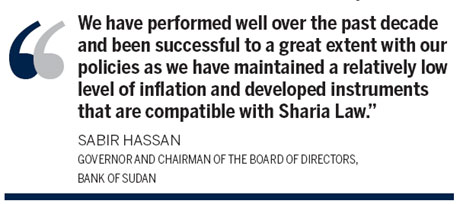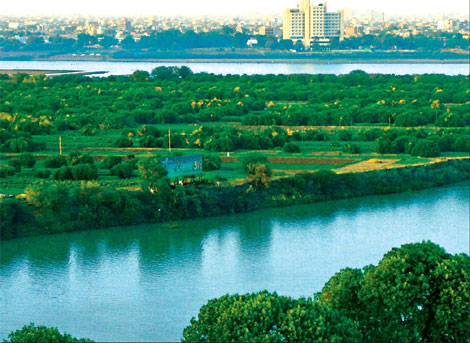News
Building bridges between two continents
(China Daily)
Updated: 2010-10-28 08:07
 |
Large Medium Small |
|
Khartoum is the country's banking and political capital. Provided to China Daily |
Ties between Chinese and Sudanese financial sectors are getting stronger
Home to a dynamic banking system featuring advanced technology and cutting-edge products and services, Sudan's financial services industry is supporting the nation's overall economic growth.
Despite lower exports and oil prices triggering a shortfall in government income last year, GDP rose nearly 4 percent and the International Monetary Fund (IMF) expects annual GDP growth of 5.5 percent in 2010 and 4.8 percent in 2011.
While those favorable forecasts may depend on continued political stability, there is no doubt that Sudan is investing billions of dollars in new infrastructure to support the country's socioeconomic development and reduce its reliance on oil revenues.
"We have performed well over the last decade and been successful to a great extent with our policies, as we have maintained a relatively low level of inflation and developed instruments that are compatible with Sharia Law," said Bank of Sudan Governor and Chairman of the Board of Directors, Sabir Hassan. "We are in close consultation with the IMF and work with them in terms of policies and reviewing our systems. The rate of return on FDI in Sudan is very high."
With roots stretching back almost a century, Bank of Khartoum is not only the oldest bank in Sudan, but also one of the largest, with an extensive portfolio of products and services that covers corporate, retail, trade finance and treasury operations.

Founded in 1913, the bank merged with Emirates and Sudan Bank in 2008 and the group now employs more than 1,000 staff members at its head office and over 50 branches across the country.
The group is backed by major financial institutions from the Middle East and its commercial activities include the acquisition, lease and sale of assets appropriate for business.
Revenues mainly come from short-term and medium-term investments, corporate banking and various retail banking operations, facilities and services.
An industry pioneer, the bank is gaining market share by expanding its range of products and breaking new ground with the terms of its financing packages that allow customers to repay financing over a longer period of time than traditionally allowed.
"We are the only bank that offers auto finance for up to six years and home finance up to 15 years. Other banks limit themselves to eight years as they don't want to take that risk," said Bank of Khartoum General Manager, Fadi Salim Al Faqih. "We are committed and that sets us apart from the competition. In the last few years, we have been the first to try new things in the market."
Focusing on the bank's solid relationship with growing numbers of Chinese companies and investors, he added: "We have issued guarantees for them and managed a lot of services for their employees and contractors. China sees a lot of potential in Sudan and Sudan requires a lot of help to develop the country, so the ties are getting stronger."
Eradicating poverty
A government-owned microfinance bank based in Khartoum, with branches in 15 of Sudan's 26 provinces, Savings and Social Development Bank targets poor people living in rural and urban areas.
As one of the largest and most important banks of its kind in Sudan, the financial organization is assisting the country's socioeconomic development by funding small businesses that create jobs and help eradicate poverty. Together with international non-governmental organizations, the company runs several community projects in rural areas.
"When we commence our operations in an area, we educate local people about banking and accommodate small savings and small transfers of money," explained Savings and Social Development Bank General Manager, Abdul Mahmoud Suliman.
"We also fund goods that raise people's standard of living. Sudan is vast and there is a lot of poverty here, so there is unlimited potential. We offer ourselves as a partner to people interested in bringing money into the country to help alleviate poverty."
According to the former Minister of Finance and National Economy, Awad Ahmed Al-Jaz, Sudan's banking sector has improved substantially in recent years and that has attracted fresh FDI from countries around the world.
"We are using our financial and monetary policies to encourage investment in priority sectors, such as agriculture, tourism and fisheries," he said.
"Our economy is moving forward and as we open our doors to international investors, we welcome our Chinese friends and believe they are sincerely looking for business openings.
"Sudan is a bridge between Africa and the Middle East and we are working very hard to reduce any obstacles to investment and make our country an investment hub for foreign businesses."
International agreements
A private bank with paid-up capital of around $100 million, Tadamon Islamic Bank was established in 1983 and has formed strong links with many Chinese companies, acting as an intermediary for other foreign banks with China.
Unlike other banks, Tadamon Islamic Bank has an account with Bank of China, a key factor that enables it to provide clients with various services that support Chinese and Sudanese importers and exporters.
"When we require money from them, we ask them to feed our account there in foreign currency. This is one of the good aspects of this relationship, which will help to overcome the problem of the 'fluctuating' dollar," explained Tadamon Islamic Bank General Manager, Abd Alla Nugd Alla Ahmaidi. "We are here to facilitate business, both for importers and exporters."
Through its broad spectrum of retail and corporate banking services, Sudanese French Bank (SFB) has grown into one of Sudan's largest banks and ended the 2009 financial year with paid-up capital of more than $50 million.
Established in 1979 and given its current name in 1993, SFB has benefited immensely from the expertise and support of Bank of Beirut, which became its major shareholder three years ago.
In addition to providing assistance in foreign currency and international transactions, Bank of Beirut has invested heavily in new technology, like a central database, as well as training for SFB employees.
In 2006, SFB launched Al-Faransi Financial Services Company, which counts the country's stock exchange among its customers. SFB has 23 branches throughout Sudan and, as testament to the loyalty and commitment shown by its managers and heads of department, its 35 most senior executives have all worked for the company for at least 15 years.
SFB General Manager, Mahgoub Hassan Shabo, said: "Our Chinese customers are satisfied with the quality and services we provide and we are looking forward to meeting with other Chinese companies in the future."
SFB Deputy General Manager, Kamal Abdul Gadir Saeed, added: "We have a very broad base of customers with diversified business interests across all sectors and are ready to accept any Chinese investor or company arriving in Sudan."
Owned by the government and the Bank of Sudan, Industrial Development Bank (IDB) is a specialized financial institution that concentrates its operations on activities that promote the country's industry development.
Established in 2005, IDB has paid up capital of $350 million and its interests focus on four main sectors. They are: spinning and weaving, leather, drugs and medicine, and agricultural product sectors - especially oils and the food industry.
"We have worked with a lot of Chinese companies and would like to form a relationship with the Bank of China," said IDB General Manager, Musaad Abdelkarim. "The economy is growing and the opportunities are there. We expect that in a few years, IDB will become a major part of the future of the industrial sector."
China Daily

(China Daily 10/28/2010 page7)
